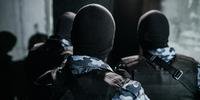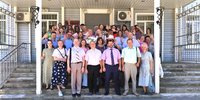The Case of Reshetnikov and Others in Gryazi
Filter
- #
Lieutenant Colonel of Justice Roman Kochanov, an investigator for particularly important cases of the first investigation department of the Investigative Directorate of the Investigative Committee of Russia for the Lipetsk Region, initiates criminal cases for faith against 5 civilians in the city of Gryazi: 46-year-old Yevgeny Reshetnikov, 42-year-old Sergey Kretov, 63-year-old Tatyana Morlang, 49-year-old Svetlana Vyrezkova and 67-year-old Natalia Perekatiy. Men are suspected of organizing "extremist" activities (part 1 of article 282.2 of the Criminal Code of the Russian Federation), and women are suspected of participating in it (part 2 of the same article). Criminal cases against five believers are combined into one — No. 12002420014000029.
The materials of Perekatiy's case state that the believer "deliberately, acting from extremist motives, expressed in propaganda of the advantage of followers of the religious teachings of Jehovah's Witnesses over other persons, a negative assessment of persons who are not followers of this religious teaching ... continued to spread the ideology and faith of this extremist organization among the residents of the city of Gryazi, Lipetsk Region." Similar wording is contained in the case files of the other believers involved.
On the same day, officers of the Investigative Committee, accompanied by riot police, conduct searches at 9 addresses in the city. Electronic devices and personal documents are seized from believers.
All five believers against whom criminal cases have been initiated, including pensioners, are placed in an isolation ward. The rest are released after interrogation.
- #
Sergey Kretov and Yevgeniy Reshetnikov are charged under Part 1 of Article 282.2 of the Criminal Code of the Russian Federation. Judge of the Gryazinsky City Court Andrey Fateev chooses a measure of restraint for peaceful believers in the form of detention and sends them to a pre-trial detention center for 2 months.
- #
Natalia Perekatiy, Svetlana Vyrezkova and Tatyana Morlang are released from the temporary detention facility.
- #
The investigator indicts Natalia Perekatiy, Svetlana Vyrezkova and Tatyana Morlang and chooses a recognizance not to leave as a measure of restraint.
- #
An appeal hearing is underway on the measure of restraint of Yevgeny Reshetnikov. The court leaves the measure of restraint unchanged.
- #
At 6:30 a.m., in the town of Gryazi, 54-year-old Aleksandr Popras and 39-year-old Valeriy Khmil are detained and sent to a temporary detention facility. Investigator Roman Kochanov opened a criminal case against them under Part 1 of Article 282.2 of the Criminal Code of the Russian Federation. The criminal case is combined into one proceeding with case No. 12002420014000029.
A search is underway in the house of Vladimir Molchanov, who lives with his wife and elderly mother in the village of Dvurechke, 22 kilometers from Lipetsk. The believer is detained and later released.
- #
Judge of the Gryazinsky City Court A. N. Fateev rejects the petition of investigator Roman Kochanov to elect a measure of restraint in the form of detention for Aleksandr Popras and Valery Khmil.
After the trial, Aleksandr is allowed to go home, the measure of restraint for him has not been chosen. Valeriy was placed under house arrest until July 16, 2021.
- #
The Gryazinsky Interdistrict Prosecutor's Office is filing appeals against the decisions on preventive measures of Aleksandr Popras and Valery Khmil. In the submissions, the prosecutor asks to cancel the court orders and detain both of them.
- #
Investigator Roman Kochanov charges 54-year-old Aleksandr Popras and 39-year-old father of three minor children Valery Khmil with "a deliberate crime against the foundations of the constitutional order and security of the state." They are charged with violating Part 1 of Article 282.2 of the Criminal Code of the Russian Federation - organizing the activities of a banned community.
- #
The court softens the measure of restraint for Sergey Kretov and Yevgeny Reshetnikov. Believers are transferred to house arrest until September 15, 2021 after 241 days in a pre-trial detention center and allowed daily hour-long walks.
The court extends Valeriy Khmil's detention under house arrest until October 15, 2021 and allows him daily two-hour walks.
- #
The Lipetsk Regional Court satisfies the believer's appeal and cancels the decision of the Gryazinsky City Court of the Lipetsk Region, releasing Valery Khmil from house arrest.
- #
Investigator Roman Kochanov changes the measure of restraint for Yevgeny Reshetnikov and Sergey Kretov from house arrest to recognizance not to leave. Electronic tracking bracelets are removed from believers.
- #
The case of the believers is received by the Gryazinsky City Court and transferred to Judge Irina Trubitsina for consideration.
- #
Hearings on the case begin. The court refuses to satisfy the defendants' petitions to refuse lawyers by appointment, but admits lawyer Sergey Kretov to the case by agreement.
- #
The court grants Aleksandr Podolin's petition for access to the case of a public defender.
- #
The lawyer provides the court with Yevgeny Reshetnikov's disability certificate in electronic form, in connection with which the hearing is postponed.
- #
Prosecutor Alexander Starkov reads out the essence of the charge against each of the 8 defendants. None of the defendants plead guilty. Aleksandr Podolin filed a motion to return the case to the prosecutor's office.
- #
The court is interrogating the daughter of Svetlana Vyrezkova. She says she thinks her mom is "the kindest person." When asked about her choice of religion and treatment, she replies: "My mother always raised me that I had the right to choose. And now I make the decisions that I think are right."
After the interrogation, the prosecutor begins to read out materials containing a transcript of wiretapping - conversations of believers on everyday topics (culinary recipes, pandemic, self-isolation, etc.).
- #
Relatives of the defendants are being interrogated. Tatiana Morlang's husband refers to poor health and enjoys the right not to testify against himself and his loved ones.
Valeriy Khmil's wife describes him as a caring husband who is ready to help others. She goes on to say that during the interrogation she faced threats from the investigation: "I was scared, [we] have three children ... Everything I said was said under pressure." When asked whether Valeriy Khmil called for religious discord or refusal of medical care by his actions or words, he answers in the negative.
From the materials of the case, the conclusions of the religious examination are read out. The court satisfies the motion of the defense to summon the author of the examination to the court.
- #
State prosecutor Boris Nikiforov reads out the case materials - volumes 5 to 23.
The court grants the lawyer's request to call the specialists who conducted the phonetic examination.
- #
Interrogation of the prosecution witness, who is a relative of Valeriy Khmil. He says that he did not know what faith Valeriy was, and did not hear that Valeriy expressed hostility towards people of other religions. Of the defendants, the witness recognizes only Sergey Kretov, to whom he once turned on electrical issues.
Deputy Prosecutor Nikiforov finished presenting all the evidence.
- #
The court examines the audio and video materials of the case. The defense notes that these recordings refute the accusations of extremism. For example, at religious meetings, there are calls to respect people of different nationalities and obey the authorities. And another material — a video of a children's party from the family archive of Valery Khmil — has nothing to do with the services of Jehovah's Witnesses.
- #
A secret witness is interrogated, whom the judge refuses to declassify. He says that he has been invited to the court "to give a truthful assessment of the testimony on biblical points." As it turns out, the witness attended services of Jehovah's Witnesses in the late 1990s and early 2000s. The man speaks negatively about this religion in general and cites a number of facts that do not correspond to reality. For example, he claims that believers do not drink wine, do not marry for love, do not go to the theater, and forbid children to read the works of Ivan Turgenev.
At the same time, answering questions from the defense, the witness admits that he did not hear any statements at the services of Jehovah's Witnesses inciting religious discord or promoting the superiority or inferiority of citizens on the basis of attitude to religion.
- #
The interrogation of the defendants begins. As Sergey Kretov explains, he is a deeply religious man, and his convictions do not allow him to cultivate hatred towards people with other religious views.
Yevgeniy Reshetnikov comments on the evidence presented by the prosecution and points out that the investigation collected only facts about the ordinary life of believers.
- #
The interrogation of the defendants continues. Valeriy Khmil notes that the investigation calls the family children's holiday a meeting for worship of Jehovah's Witnesses.
Svetlana Vyrezkova, who has been married for over 30 years, responds to the accusation of calling for the rupture of kinship and family relations: "I am a supporter of traditional family values, I am married, I have two daughters and a grandson. When and whose family did I encourage to break up? This has never happened!"
A similar thought is expressed by Aleksandr Popras: "I have been married to my wife for 35 years and have never regretted it. We raised two children, instilled in them honesty, respect for elders, hard work. Now we have four grandchildren, and we also want them to grow up to be honest and useful to society."
Tatyana Morlang says: "In my life, I am guided only by the Bible, and it teaches goodness, not hatred."
And this is how Natalia Perekatiy explains her motives: "When I read the Bible, sing songs about God or talk to someone... [about him], I do not and do not want to harm others. I want other people to live easier, so that they have hope."
Aleksandr Podolin emphasizes that he never had the goal of harming the state or its citizens.
- #
The prosecutor requested large fines for the defendants as a punishment: Podolin - 800 thousand rubles; Popras - 790 thousand rubles; Khmil - 750 thousand rubles; Kretov and Reshetnikov - 500 thousand rubles each; Vyrezkova and Morglang - 490 thousand rubles each and Perekatiy - 400 thousand rubles.
- #
In addition to the participants in the trial, about 35 people are present in the courtroom. Aleksandr Podolin says that his faith in Jehovah God is based on the Bible and, according to the Constitution of the Russian Federation, he has the right to practice this religion.
The defense draws the court's attention to the fact that in Russia the religion of Jehovah's Witnesses is not prohibited, and prayer and preaching are not crimes. It is noted that the prosecution has no facts proving the extremist activities of believers. Lawyers ask the court to acquit their clients.
- #
The defendants give their final statement.
Final Statement of Defendant Aleksandr Podolin in Gryazi Final Statement of Defendant Aleksandr Popras in Gryazi Final Statement of Defendant Natalia Perekatiy in Gryazi Final Statement of Defendant Sergey Kretov in Gryazi Final Statement of Defendant Valeriy Khmil in Gryazi Final Statement of Defendant Yevgeniy Reshetnikov in Gryazi - #

